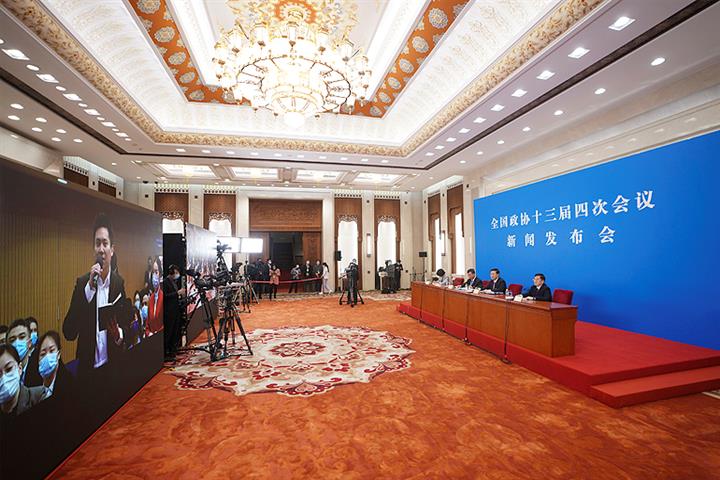 China’s 14th Five-Year Plan, Goals Through 2035 Top Agenda at Two Sessions
China’s 14th Five-Year Plan, Goals Through 2035 Top Agenda at Two Sessions(Yicai Global) March 4 -- Discussions on the draft outline of the 14th Five-Year Plan and the Chinese government’s long-range objectives through the year 2035 will be high on the agenda at this year’s Two Sessions, which kicked off in Beijing today.
Fiscal and monetary policies as well as issues concerning people’s livelihoods, such as employment, will be hot topics at the Two Sessions, or lianghui, the annual meetings of the national legislature and top political advisory body.
China was the world’s only major economy to grow last year and must make great efforts to keep the economy running steadily this year because of uncertainties from the Covid-19 pandemic and complicated global economic situation, Guo Weimin, spokesperson for the fourth session of the 13th National Committee of the Chinese People’s Political Consultative Conference, told a press conference yesterday, citing CPPCC members.
Expectations for China’s economic situation this year are similar, and the economy will expand quickly and then slow through the year, Wang Jingwen, a senior analyst at Pangoal Institution, told Yicai Global.
Due to the low base last year, growth is expected to be close to 20 percent in the first quarter, more than 10 percent in the second, and then fall back to about 6 percent in the third and fourth quarters, Wang said, adding that full-year growth is expected to average about 8.5 percent.
In its latest World Economic Outlook published in January, the International Monetary Fund projected the country’s gross domestic product to gain 8.1 percent in the 12 months through December.
Proactive Fiscal, Monetary Policies
The market will pay close attention to fiscal and monetary policies as well as specific indicators such as fiscal deficits and the size of local government special bonds this year, Wang said.
China adopted an aggressive fiscal policy in response to the coronavirus outbreak last year, with a significant increase in the size of its fiscal deficit and special local government debt, as well as a record CNY2.5 trillion (USD386.4 billion) in tax cuts and fees, experts told Yicai Global. That all played a key role in stabilizing the economy.
But as the economy steadily recovers, a proactive fiscal policy will focus on being “more sustainable,” gradually returning to normal. The policy will reasonably determine the size of deficits and local government special bonds, keep the economy running within a reasonable range, but also leave policy space to meet new risks and challenges in the future, the fiscal and tax experts said.
China will continue with a proactive fiscal policy and prudent monetary policy this year, maintaining necessary support for the recovery while avoiding premature withdrawal of support measures, according to Finance Minister Liu Kun.
The fiscal deficit is widely expected to be lower than last year. Jia Kang, head of the China New Supply Economics Research Institute, believes the country will lower the fiscal deficit rate this year, but not by much, suggesting a rate of between 3 percent and 3.5 percent.
Employment Focus
People’s livelihoods, typified by employment, will be a major concern at the Two Sessions.
China faces favorable conditions this year in that the coronavirus is under control and the economy is rebounding rapidly, Zeng Xiangquan, head of the China Institute for Employment Research under Renmin University of China, told Yicai Global. This will boost employment.
“The downside for employment is that there is still a lot of uncertainty and inflationary pressure is rising,” Zeng said. “If macroeconomic control is tightened, it may have some impact on the economy and employment.
“Meanwhile the pandemic continues to have an impact on economic activity amid uncertainty over how it will develop and the low number of vaccinated people,” he said.
The number of college graduates will hit a new high of 9.09 million this year, according to data from the Ministry of Human Resources and Social Security. Tens of millions of jobs will be needed if students overseas return home and unemployed graduates from last year are factored in.
China’s next step is to stabilize the jobs situation by protecting market players and provide targeted employment services to university graduates and migrant workers, according to Human Resources and Social Security Minister Zhang Jinan.
Editor: Peter Thomas